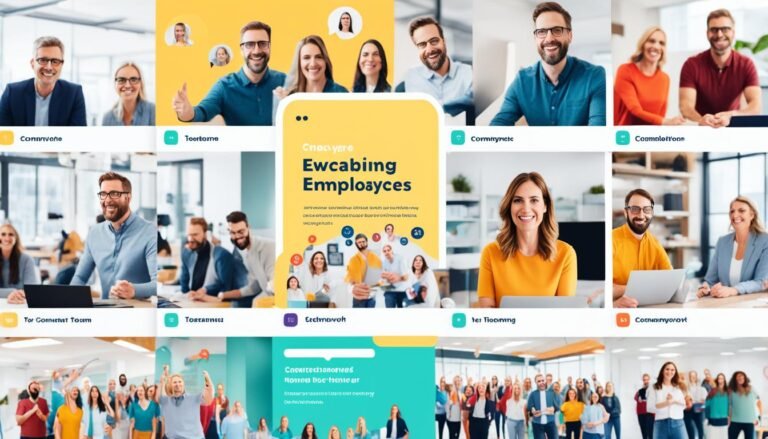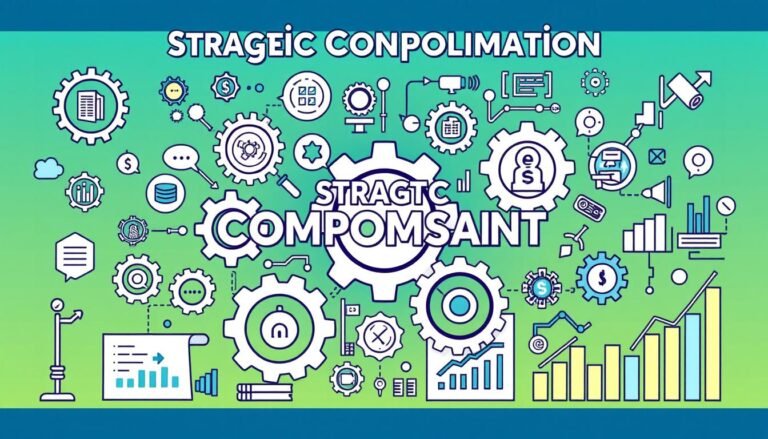The Future of HR: Navigating Technological Disruption
The world of Human Resources is changing fast. HR technology and digital transformation are reshaping how companies manage their workforce. As we look to the future, HR professionals must adapt to new tools and methods.
Artificial Intelligence (AI) is leading this change. By 2025, 72% of organizations will use AI in HR processes. This shift is not just about efficiency; it’s about creating better workplaces. AI helps in hiring, training, and keeping employees happy.
Workforce analytics is another game-changer. It allows HR teams to make smarter choices based on data. Companies are using these insights to plan for the future and solve problems before they happen.
Remote work is here to stay, and HR tech is making it possible. 94% of companies now use special tools to manage remote teams. This includes ways to keep people connected and productive, no matter where they work.
Key Takeaways
- AI is becoming a core part of HR, with 72% adoption expected by 2025
- Data-driven decision making is on the rise in HR departments
- Remote work management is a priority for 94% of companies
- Employee well-being is a focus, with 79% of businesses using tech for support
- Diversity and inclusion efforts are supported by HR tech in 88% of organizations
Understanding Technological Disruption in HR
Technological disruption is changing how companies manage their workforce. HR professionals need to keep up with these changes. New tools are making HR practices more efficient and based on data.
Defining Technological Disruption
Technological disruption in HR means big changes from digital innovations. These changes are making recruitment, employee engagement, and performance management better. HR automation is key, making routine tasks easier and freeing time for big ideas.
Historical Context and Evolution
HR technology has grown fast. We’ve moved from paper to cloud-based systems, making things more efficient and data easy to access. Now, HR uses AI and analytics to make better decisions.
Key Technologies Shaping HR
Several technologies are shaping HR’s future:
- AI and Machine Learning for smarter recruitment
- Cloud-based HR Management Systems for centralized data
- Analytics tools for data-driven insights
- Chatbots for employee support and engagement
These innovations are changing HR’s role. HR leaders need to know technology and understand data well. This is key to succeed in today’s world.
“To be in the top 10 percent of the HR profession, expanding HR technology knowledge is crucial.”
As companies face technological disruption, those who adapt will attract the best talent. They will also drive business success.
The Role of Artificial Intelligence in HR
Artificial intelligence is changing how we manage talent. As AI becomes a bigger risk, HR’s role grows. A huge 70% of HR folks think AI will be key in managing people.
AI for Recruitment and Talent Acquisition
AI makes hiring easier by automating first steps. It cuts down on bias and picks better candidates. Already, 25% of HR managers use AI, showing it’s becoming more common.
Enhancing Employee Experience with AI
AI helps make learning plans and checks how well employees are doing. It also looks at what employees feel, making work better for everyone. In healthcare, AI saved one company over $2,000 per person.
Ethical Considerations of AI Use
AI brings benefits but also raises big questions. It can keep old biases alive, leading to unfair treatment. We need humans to check AI to avoid mistakes. The U.S. is starting to make laws to ensure AI is used fairly at work.
| AI Impact Area | Statistic |
|---|---|
| HR Managers Using AI | 25% |
| HR Professionals Believing in AI’s Future Influence | 70% |
| Employer Savings with AI Predictive Analytics | $2,000+ per individual |
AI is reshaping HR, but we must balance innovation with ethical considerations to create fair and effective talent management strategies.
Remote Work: A New Normal in HR Management
Remote work has changed HR management a lot. It has made HR technology and employee experience key. Now, HR must manage teams that work from anywhere.
Strategies for Effective Remote Team Management
HR leaders are changing how they manage teams online. A Mercer survey shows 87% of companies now use remote work. They need to make sure everyone is good at using digital tools.
Tools Supporting Remote Work Environments
HR technology is vital for remote work. Tools like virtual collaboration, onboarding, and tracking are needed. They help teams work together and stay connected online.
Maintaining Company Culture Virtually
Keeping company culture alive online is a big challenge for HR. With 82% of leaders planning to keep remote work, HR must find new ways. They use technology for team-building and keep everyone informed.
“Work flexibility is a determining factor in job satisfaction and performance.”
As remote work grows, HR needs to be quick to adapt. They must use new tech and strategies to make the virtual workplace great for employees.
Data Analytics: Revolutionizing HR Decision-Making
Data analytics is changing how HR departments work. It brings in a new era of using data for better decisions. This change is making old HR ways better, leading to smarter choices.
Importance of Data-Driven Approaches
HR analytics helps make choices based on facts, not guesses. It lets HR folks see patterns in how employees act, perform, and feel. This leads to better plans for keeping and growing talent.
Common HR Metrics and Analytics Tools
HR uses many metrics and tools to understand their team. These include:
- Employee turnover rates
- Performance indicators
- Engagement levels
- Training effectiveness
Advanced analytics platforms combine these, giving a full view of how well the company and employees are doing.
Predictive Analytics in Workforce Planning
Predictive analytics changes how HR plans for the future. It uses past data to forecast trends and needs. This is key for:
- Spotting top talent
- Seeing who might leave
- Improving how they find new people
With predictive analytics, HR can tackle problems early and grab chances before they pass by.
| HR Analytics Application | Impact |
|---|---|
| Turnover Prediction | Up to 20% reduction in voluntary turnover |
| Performance Analytics | 15% increase in productivity |
| Recruitment Analytics | 30% decrease in time-to-hire |
As HR automation grows, using workforce analytics will become even more important. Companies that use these tools will have a big edge in managing talent and doing well overall.
Employee Experience and Engagement in a Digital Age
The digital age has changed how we view employee experience and engagement. Today, companies focus on making every interaction positive. This approach aims to keep employees happy and productive in a competitive job market.
From Satisfaction to Engagement
Just being satisfied is not enough anymore. Now, companies want employees to be actively engaged. They create meaningful work, support growth, and build strong connections. This leads to more innovation and productivity.
Tech-Driven Feedback and Surveys
Technology is key in measuring and improving engagement. Companies use digital tools for quick feedback and surveys. These tools help spot problems fast and shape better strategies for managing talent.
| Tool | Purpose | Impact |
|---|---|---|
| AI-driven surveys | Gather employee insights | 53% increase in response rates |
| Cloud-based platforms | Performance management | 64% reduction in HR admin time |
| Digital learning hubs | Skill development | 3.8 million minutes of video content viewed monthly |
Successful Engagement Initiatives
Top companies are changing employee experience with new programs. For example, Accenture’s digital worker site gets 24,000 visits a month. It offers resources, training, and tools for collaboration. These efforts increase engagement and productivity in the digital workplace.
“Organizations focusing on digital employee experience management report improvements in satisfaction, engagement, and business performance.”
By using technology and focusing on employee needs, companies can create a great digital work environment. This not only improves employee experience but also boosts business success.
Learning and Development: Adapting to Change
The world of work is changing fast. Continuous learning is key for success. HR technology is crucial in shaping new learning strategies. Let’s see how companies use these tools to grow and adapt.
E-Learning Platforms and Online Training
E-learning platforms have changed employee training. They offer flexible, accessible learning for all. Companies use online courses for training on compliance and leadership skills.
Personalization in Employee Development
HR technology helps create personalized learning paths. AI-driven platforms suggest courses based on individual needs. This ensures employees gain skills that matter most for their roles and future.
Measuring Learning Outcomes Effectively
Digital learning platforms track employee progress and engagement. HR can see completion rates, quiz scores, and skill application. This data helps improve training and align it with business goals.
- Track course completion rates
- Analyze quiz and assessment scores
- Measure skill application in real work scenarios
- Gather feedback through surveys and discussions
By using these technologies, companies can foster a culture of continuous learning. This not only improves employee skills but also boosts engagement and retention in a fast-changing business world.
Diversity, Equity, and Inclusion Powered by Technology
HR technology is changing how we tackle diversity, equity, and inclusion (DEI). In 2024, making DEI a key part of every organization is crucial. HR leaders are leading the charge to make this happen.
Leveraging Tech to Promote Diversity Recruitment
Now, AI helps in hiring by spotting and fixing biases. This tech ensures fair hiring and opens up the talent pool. Companies with diverse teams saw a 25% boost in profits in 2019.
AI Tools for Unbiased Decision-Making
AI is making decisions fairer through advanced algorithms. These tools check if promotions and pay are fair. They also offer training on bias and leadership.
Measuring DEI Initiatives and Impact
Analytics tools are changing how we track DEI progress. This data helps set and meet DEI goals. In 2019, companies with diverse teams saw a 36% profit increase.
| DEI Metric | Impact |
|---|---|
| Gender Diversity | 25% higher profitability |
| Ethnic Diversity | 36% higher profitability |
| Women Executives | 48% more likely to outperform |
By using HR tech and agile practices, companies can build inclusive workplaces. This leads to the benefits of diverse teams.
Cybersecurity and Data Protection in HR
The digital world has changed HR, bringing new security challenges. Protecting employee data is now more important than ever. In the last two years, HR has seen a 30% rise in cyber attacks.
Understanding Compliance and Regulations
HR must keep up with data protection laws. Many companies need to improve their security awareness. Cyber attacks can cost a lot, with an average of $150,000 to fix.
Protecting Employee Data: Best Practices
Strong security is key. Regular checks help find and fix weak spots. HR should use encryption, secure storage, and access controls to keep data safe.
The Role of HR in Cybersecurity Awareness
HR is crucial in teaching cybersecurity. Most breaches come from human mistakes. The need for HR with cybersecurity skills has grown by 40% in three years.
| Cybersecurity Aspect | Statistic |
|---|---|
| Increase in HR sector cyber incidents | 30% in 2 years |
| Average cost of cyber attack recovery | $150,000 |
| Breaches caused by human error | 82% |
| Rise in demand for cybersecurity-skilled HR professionals | 40% in 3 years |
As HR tech grows, security and data protection are essential. They are not just nice to have, but necessary for good HR in today’s digital world.
The Future Workforce: Skills and Competencies Needed
The future workforce needs a blend of technical skills and soft skills. Technology is changing industries, and HR must adapt. This brings new challenges and chances.
Emphasizing Soft Skills in Technology-Driven Environments
In today’s digital world, soft skills are more important than ever. Skills like adaptability, emotional intelligence, and critical thinking are key. They help employees handle complex tasks and work well with different teams.
Lifelong Learning and Continuous Development
Upskilling and reskilling are now crucial for career advancement. Companies are investing in ongoing learning to stay ahead. By 2025, 60% of HR departments will use AI for training and development.
Preparing for Emerging Roles in HR
HR roles will soon require a mix of old knowledge and new tech skills. HR pros need to learn about strategic business and agile practices. They must also be ready to adapt quickly to new tech.
| Skill Category | Growth in US (2016-2030) | Growth in Europe (2016-2030) |
|---|---|---|
| Advanced IT and Programming | 90% | 41% |
| Basic Digital Skills | 69% | 65% |
| Social and Emotional Skills | 26% | 22% |
| Cognitive Skills (Creativity, Critical Thinking) | 19% | 14% |
Looking ahead, HR must embrace these shifts. By focusing on a balanced skill set, they can guide their companies into a new work era.
Best Practices for Navigating Technological Change
HR professionals face big challenges with technological changes. The global talent scene is changing fast, with Millennials and Gen Z leading the way. These changes, along with quick tech advancements, make it tough for HR teams.
Change Management Strategies for HR
Effective change management is crucial for adopting new tech. HR teams should lead by example, using new tech and guiding others. McKinsey says 800 million jobs could be automated by 2030, showing the need for quick adaptation.
Encouraging a Culture of Innovation
In today’s fast world, innovation is key. HR can boost this by offering continuous learning and testing new tech. With 70% of companies focusing on digital HR, staying innovative is vital for success.
Collaborating with IT and Other Departments
HR, IT, and other departments must work together well. This teamwork helps solve issues like system integration and data security. By collaborating, HR can quickly adapt to new tech and workforce needs.
Source Links
- HR Technology Shaping 2025: Navigating the Future of Human Resources
- Future-proofing HR: Technological disruptions in human resource management. – HR, StartUps and Industry Bytes | Employehub
- Embracing Digital Disruption in HR: Strategies for Success
- The Most Disruptive Technologies in HR Today
- How Artificial Intelligence is Transforming Human Resources and the Workforce
- The Impact of Artificial Intelligence on HR Processes
- Remote work as a new normal? The technology-organization-environment (TOE) context
- Adjusting to the new normal in HRM: Ways HR practitioners can adapt to the current and future work challenges
- Future-Proofing HR: Navigating Technological Disruptions in Human Resource Management
- Navigating the Future of HR: Discover the Next-Gen Technologies and Trends Redefining Human Resources – Merritt Business Solutions
- HR Analytics and Data-Driven Decision Making: The Future of HR
- Navigating the Future: Employee Engagement Trends for 2024 | Cooleaf
- Digital Employee Experience: A Definitive Guide for 2025
- Leveraging digital transformation to improve employee experience
- Navigating HR Challenges in a Disrupted World: A Guide
- A practical guide to navigating HR digital transformation | InStride
- Navigating the Future: Key HR Skills in the Digital Age – Nestor
- Navigating Disruptions: From HR Novice to Analytical and Reliable Leader
- Navigating the Evolving Landscape: HR Challenges in 2024
- Diversity wins: How inclusion matters
- Cybersecurity in HR Practices: Build Resilient Organizations | EC-Council University
- 11 HR Trends for 2025: Embracing Disruption
- Why HR Leaders Must Help Drive Cyber Security Agenda
- Strategic Workforce Planning: Navigating the Future of HR
- HR’s Role in Navigating the Future of Work: Strategies and Insights
- Skill shift: Automation and the future of the workforce
- Navigating HR Challenges in a Disrupted World: A Guide | JD Supra
- Navigating Technological Waves in the Evolving HR Workplace – HRProfessionalsMagazine
- Navigating the HR Challenges of Digital Transformation








